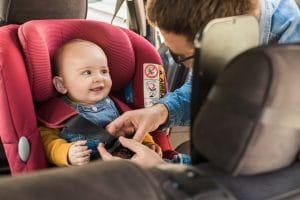Check Your Child’s Car Seat Before You Travel
 Many of us have been pausing our travels and staying home (or close to home) because of the pandemic. However, now that the vaccination numbers are increasing, those travel plans may be forefront in our minds again. If you plan to bundle up the family and take the short trip over to Grandma’s for dinner, or a longer trip to see friends and family, remember to keep the kids safe by performing regular car seat checks.
Many of us have been pausing our travels and staying home (or close to home) because of the pandemic. However, now that the vaccination numbers are increasing, those travel plans may be forefront in our minds again. If you plan to bundle up the family and take the short trip over to Grandma’s for dinner, or a longer trip to see friends and family, remember to keep the kids safe by performing regular car seat checks.
With young children and cars, you should always ask:
- Is my child in the right size seat?
- When should I turn a rear-facing seat around?
- When can my child move from a booster seat or to the front seat?
Making the wrong choice on any of these can put your child at risk for injury in the event of a car accident.
New Jersey car seat laws
The State Department of Law & Public Safety last updated its child passenger safety laws in 2015, but it’s important to have a refresher.
- Infants and toddlers. Children between age zero and two, who weigh less than 30 pounds, must use rear-facing car seats with a five-point harness system. This seat should be in the back seat away from airbags. These types of car seats best protect a baby’s head and body.
- Two- to four-year-olds. Children under four, who weigh under 40 pounds, must sit in either a rear- or forward-facing car seat. Both must have a five-point harness system and placed in the back seat away from airbags.
- Four- to eight-year-olds. Children should remain in car seats or booster seats until they’ve reached the age of eight and/or 57 inches in height.
- Eight years and older. Once a child has reached the age of eight and 57 inches tall, children may forgo car seats, but must use seat belts.
There are no hard and fast rules about when it’s safest for children to sit in the front seat of the car, but the Centers for Disease Control and Prevention (CDC) recommends children stay in the back seat until they’re around 13 years old.
The CDC also points out that seat belts and car seats greatly reduce a child’s risk of fatal injury in an accident. Their data shows:
- In just one year, seat belts and restraints saved the lives of 325 children under five years old
- Car seats reduce the risk of injury to children by 71 to 82 percent compared to seat belts alone
- Booster seats reduce the risk of injury to children ages four to eight by 45 percent compared to seat belts alone
Children grow fast, and so do their car seat and seat belt requirements. Before you hop in the car for the holidays, make sure they’re in the right seat – their safety depends on it. And you can always check to see if your car seat has been recalled at the NHTSA website.
If you or your child suffered injury in an accident due to a defective car seat or negligent driver, talk to the attorneys at Eichen Crutchlow Zaslow, LLP today. We will protect your rights and seek compensation on your behalf. To arrange a free consultation about your case, call us today at 732-777-0100, or leave us a message through our contact form. We handle cases throughout the state from our offices in Red Bank, Toms River, and Edison.

Eichen Crutchlow Zaslow, LLP has purposely remained small in size, because it is important to us that we get to know our clients and their needs. Larger NJ injury firms may churn out case after case, but that’s not how we operate. Partners Barry Eichen, William Crutchlow, and Daryl Zaslow have created a firm with the resources to handle complex litigation, and a team that takes your case personally.
Find out more about Eichen Crutchlow Zaslow, LLP
